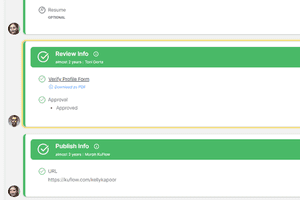Raising Financial Efficiency to New Horizons with Automation
Published 14-02-2024 by KuFlow Team

Credits: Pexels
In the dynamic financial world, automation is essential to boost efficiency and achieve optimal results.
Discover the transformative power of automation in every corner of the financial department, from issuing invoices to proactive collection management.
Automation can become the trusted partner of accounting, real-time bank reconciliation becomes a reality, and instant financial reporting becomes essential for agile decision-making.
This article inspires the adoption of technologies that simplify daily operations and transform the financial department into an engine of productivity.
Join us towards a smarter and more efficient financial future, where automation is the key to sustainable success in today's financial world.
What is automation in the financial department?
Gartner defines finance automation as technology that integrates task automation, machine learning and artificial intelligence for use in areas such as financial analysis, payroll administration, invoice automation, collections action, and preparing financial statements. Such automated software reduces the need for human intervention in these activities.
Why we need to automate the finance area
The automation of processes in the financial area is not only a strategic option, but an imperative necessity. Taking a closer look at the reality of many finance teams, the question arises: is your finance team stuck in repetitive, routine and unproductive tasks?
If closing books and preparing financial statements takes considerable time, if manual reconciliations and updating multiple Excel spreadsheets are commonplace, and if your current accounting system involves manual workarounds and constant re-entry of data, then automation is the key to freeing your team from the burden of these annoying tasks.
Detecting a high rate of errors in reports and a lack of agility in data visualization are clear signs that automation can radically transform your financial landscape.
By adopting automation in the accounting department, you not only streamline operations but also boost team morale by allowing them to focus on higher-value activities. Digital transformation is not only a technological change but a revolution that unleashes human potential for making informed and strategic decisions.
Benefits of financial management automation
Through effective automation, you can expect the following benefits in your daily operations:
- Productivity increase
- Time saving
- Acceleration of financial processes and greater agility
- Reduction of human errors
- Greater data consistency and accuracy
- Greater ease of audit management
- Better communication and collaboration with other departments
- Task reminders
- Programming facilitation
- Better reports
How to apply automation in the financial field and administration
- Automation of financial reports
- Financial reporting automation revolutionizes efficiency in crucial tasks, including account reconciliations, monthly closing, data consolidation, and financial statement preparation.
- This process encompasses the automatic generation of common reports such as quarterly and annual financial statements, financial statement analysis, bank reconciliations, balance sheets, profit and loss statements, as well as cash flow forecasts and shareholder equity statements.
- Automation not only saves time but also ensures accurate and strategic reporting for informed decision-making.
- Quick approvals
- The automation of approvals streamlines processes, avoiding endless emails, phone calls or physical searches for a manager to obtain approval.
- This efficient approach not only speeds up operations, but also improves collaboration and reduces decision-making latency, optimizing the productivity of the finance team.
- Data consolidation
- Automating data consolidation allows you to extract information from various sources (such as several Excel sheets or different ERP applications), eliminating the need to switch between programs and manually compile scattered data.
- An automatic consolidation not only saves time, but also reduces errors, ensuring accurate and consistent data for detailed financial reporting and strategic analysis.
- Risk and credit management
- Automation in customer credit management allows effective and agile control, optimizing a healthy income structure and minimizing collection risk.
- Automation of approval flows, credit reviews for new and existing clients, dynamic on-demand evaluations and documentation verification is possible efficiently.
- With configurable scoring models and risk-based decisions, exceptional efficiency is achieved, allowing orders to be retained and released more quickly through algorithmic decision-making based on configurable rules.
- Sales management
- Order processing
- Manual order processing involves a significant burden, slowing down the entire process and increasing the risk of discrepancies and human errors.
- Through process automation, it is possible for the system to manage the entire process, allowing humans to focus on shipping orders and increasing sales to generate more income. Automation ensures efficiency and accuracy in this critical process to improve customer experience and maximize profits.
- Billing
- The automation of invoice generation optimizes the sales process and allows collections to be generated in a matter of minutes. The generation of invoices can be addressed based on data on services provided and merchandise delivered according to demand or schedule.
- Billing automation not only speeds up processes but also ensures accuracy and regulatory compliance.
- Collections
- Collection automation simplifies processes by improving credit risk management and efficiency in communication with clients, including debt reviews, processing and reconciling collections, and creating and sending pending payment reminders and notices.
- Order processing
- Purchase Management
- Purchasing automation not only optimizes processes but also improves communication with suppliers and efficient supply chain management.
- Automation in purchasing speeds up the generation of work orders, orders to suppliers, tracking of shipments, updating accounts and sending reminders.
- One of the many automation opportunities lies in simplifying the registration of new suppliers following the policies established by the company.
- Thanks to process automation, the system can handle high-volume requests fluidly, working on multiple accounts simultaneously, as well as attending to routine customer queries regarding account statements, balances, payment queries and updates.
- Automated evaluation of supplier invoices goes further by matching them with purchase orders, also allowing you to detect duplicate records and identify problems that require manual intervention. In this way, it is also possible to reduce the risk of errors and speed up the identification of potential problems.
General conclusions
In today's dynamic financial scenario, process automation emerges as the key catalyst to transform financial and administrative management. From revolutionary financial reporting automation to agility in approval management and data consolidation, each step towards automation redefines operational efficiency.
Optimization in risk and credit management, support for strategic decision making through more agile reports, the ability to generate invoices in minutes and simplify the complexity of the accounts receivable and customer relationships offers a vision of a more agile and profitable financial future.
This journey towards digital transformation in financial departments is not only a response to the demands of the present, but also a strategic investment for the future. The combination of advanced technology, optimized workflows and the ability to adapt to changing market demands positions companies at the forefront of financial efficiency.
By adopting these automation solutions, organizations not only free up valuable resources and reduce errors, but also create an environment conducive to innovation and informed decision making. Ultimately, automation not only drives efficiency, but also lays the foundation for sustainable business success in the digital age. Welcome to the automation-driven financial future!
Visit us at KuFlow to start your automation journey.





